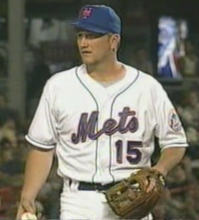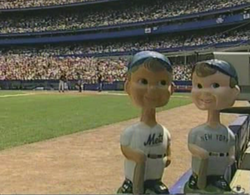Click here for an intro/manifesto on The 1999 Project.
July 2, 1999: Braves 16, Mets 0
The Mets welcomed the Braves to Shea for the first time in 1999, and the Braves found it very welcoming indeed. Chipper Jones (who else) commenced the scoring with a two-run shot in the first, and it was all downhill from there. Masato Yoshii was torched for eight runs in only three innings–and the Braves had scored only half their runs yet.
The Braves might have been helped (at least at first) by their dugout monitors, which showed them the game feed instead of the bullpen, thus giving them a bird’s eye view of Mike Piazza’s pitch calling. They were quick to point out this error–after the top of the first.
No such help was needed on the mound. Greg Maddux continued his mastery over the Mets, allowing just two hits in six innings of work. The famously economical Maddux presumably felt no need to tax himself beyond that point, considering he had a 12-run lead. After a shaky (for him) start to his season, Maddux proved once again that he had lost nothing–and would continue to be a thorn in the Mets’ side.
The Braves piled on with two runs in the fourth inning, and a run each in the fifth and sixth. They added both insult and injury in the ninth, when John Franco came on to pitch. The Mets’ closer hadn’t pitched in several days, so despite the score, he was due for some work. After allowing a run, then back-to-back walks, Franco stalked off the mound with pain in his left hand that would later be diagnosed as a strained tendon.
 Having burned through all of his bullpen already, and short one position player (Edgardo Alfonzo was away from the team, attending the birth of his son), Bobby Valentine was forced to be creative. He used starter Rick Reed in right field, who took the spot of Roger Cedeno, who moved to second to take the place of Luis Lopez, who moved to third to take the place of Matt Franco, who took to the mound to try and get the final out of the ninth.
Having burned through all of his bullpen already, and short one position player (Edgardo Alfonzo was away from the team, attending the birth of his son), Bobby Valentine was forced to be creative. He used starter Rick Reed in right field, who took the spot of Roger Cedeno, who moved to second to take the place of Luis Lopez, who moved to third to take the place of Matt Franco, who took to the mound to try and get the final out of the ninth.
Matt became only the second position player to pitch for the Mets (the first was the immortal Bill Pecota in 1992). Gerald Williams turned on the third pitch Franco threw and launched it for a three-run homer. But he also managed to stop the bleeding by striking out Andruw Jones. “I think the disappointment of the night had gone past by then,” Franco told reporters later. “It was fun. The 16-0 loss wasn’t worth it.”
That margin of defeat represented the most lopsided shutout in Mets history. And just to add a little bit of strife to an already bad situation, Bobby Bonilla challenged a fan to a fight after he was booed for dropping a pop-up.
July 3, 1999: Braves 3, Mets 0
On a muggy night, Al Leiter limited the Braves to three runs, but his teammates continued to be baffled by Atlanta pitching. This time, the culprit was Kevin Millwood, who no-hit the Mets for four innings and gave up only three hits total.
Brian Jordan–who said he’d make New York regret not signing him in the off season–started the scoring in the top of the fifth with a two-run homer (on what Jordan called “the straightest fastball I’ve ever seen Leiter throw”). The Braves scratched out another run in the sixth to give themselves a 3-0 lead. The way the Mets were hitting, it might as well have been 300-0.
In the bottom of the fifth, Robin Ventura led off with a single to break up Millwood’s bid for a no-no. Just so the Mets wouldn’t get any ideas about turning their luck around, Benny Agbayani followed with a strike out while Ventura was picked off of first. It was as close to a rally as they would come against Millwood.
The Atlanta starter tried to go the distance, but he walked Brian McRae to start the ninth, prompting Bobby Cox to turn to his closer, John Rocker. The hard-throwing lefty looked almost human when he threw a wild pitch and gave up a single to pinch hitter Todd Pratt, putting runners at the corners with nobody out.
But Rocker induced harmless fly outs from Edgardo Alfonzo and John Olerud. The Mets were down to their last out, but they also had Mike Piazza coming to the plate as the tying run. Alas, there were no heroics in his bat this time–he struck out to end the game.
Going back to the series in Atlanta, the Mets hadn’t scored a run against Braves pitching in 28 innings. Millwood, the latest architect of their futility, summed up the feeling of the budding rivalry. “”We said when we started to play these guys to keep them down and don’t let them get their confidence up,” he told reporters after the game. “So far, we’ve done a pretty good job.”
To make matters worse, the Mets were forced to put John Franco on the DL with what they termed a strained flexor tendon in his left middle finger. Rigo Beltran was called up from Norfolk to take his place on the roster. Bobby Valentine anticipated handing the closer’s job to Armando Benitez. He’d filled that role for the Orioles, but he’d also been traded from Baltimore for his propensity to blow up in big moments.
July 4, 1999: Mets 7, Braves 6
The Daily News‘ Vic Ziegel opened his story thusly, in one of the weirder lead paragraphs I’ve ever read:
Somebody else will have to explain how the Mets won this game. The
rumor making the rounds before Mets 7, Atlanta 6 last night was that
the Mets need only one look at the tomahawk shirts to turn to jelly.
Last year’s jelly, hidden in the back of the fridge. What is that
smell?
This game marked the Mets’ last chance to do direct damage to the Braves for quite some time–the two teams wouldn’t meet again until September 21. That damage would have to be done against the always tough John Smoltz, although the righty was rumored to be dealing with some elbow issues.
Orel Hershiser started for the Mets and immediately put the Mets in a hole by giving up back-to-back solo shots to Bret Boone and Chipper Jones. But they touched up Smoltz for three runs on three hits in their half of the first.
Not only had the Mets finally scored against the Braves, but they even padded their lead on an Alfonzo RBI double in the second inning. It would not last for long. In the top of the third, another solo homer from Boone, a sac fly from Ryan Klesko, and a two-run shot by Randall Simon scored four runs, chased Hershiser from the game, and put Atlanta back in front, 6-4.
Pat Mahomes and Rigo Beltran helped restore order and prevent the Braves from scoring any more runs. Greg McMichael pitched the top of the seventh and got into a bases loaded jam, but Dennis Cook came on to get the last out and keep Atlanta off the board. As good as their relief efforts were, it all seemed pointless, as the Mets could not dent Smoltz any further. They were retired with little incident in the third, fourth, fifth, and sixth innings.
Then in the bottom of the seventh, Rey Ordonez hit a lead off single and Brian McRae followed with a walk. Rickey Henderson bunted them into scoring position, but that proved unnecessary, because Alfonzo crushed a Smoltz fastball to straight-away center to give the Mets a 7-6 lead.
Cook stayed on to set down the Braves in order in the eighth. Then Armando Benitez came on in the ninth for his first appearance as the Mets’ interim closer. He rose to the occasion by striking out the side, which consisted of three batters who’d given the Mets fits over the last three games: Boone, Chipper, and Jordan.
After the game, Bobby Valentine simply said, “It was a test if there’s ever been test.”
 July 9, 1999: Mets 5, Yankees 2
July 9, 1999: Mets 5, Yankees 2 July 5, 1999: Mets 2, Expos 1
July 5, 1999: Mets 2, Expos 1